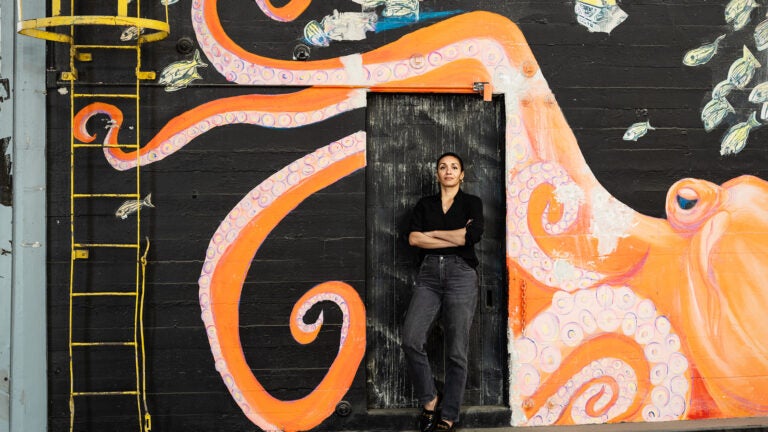
Who Is Jade Clemons and How Is She Boosting California’s “Blue Economy”?
Settled in front of her home computer on a Monday evening in August, Jade Clemons ’19 uncorks a loud, hearty laugh when asked about finding her way into the Blue Economy — a rising economic sector that seeks to conserve marine and freshwater environments while stimulating economic growth through the production of ocean-derived resources such as clean energy and food.
“Oh, where to begin?” the 35-year-old chuckles.
Clemons’ past is a long and winding adventure, featuring degrees from three different institutions, cross-country moves, a career shift and jobs at more than a dozen organizations. She’s faced bouts of self-doubt. She’s endured soul-searching. And there have been more starts and stops than she wishes to recall.
But as Clemons transitions from recounting her past to discussing the present and the role she started last December, the self-deprecating humor disappears. It’s replaced by earnest appreciation for the here and now as she discusses her initiative to help entrepreneurs scale ocean-oriented businesses ranging from sustainable seafood to water desalination. Based at AltaSea — a nonprofit at the Port of Los Angeles that promotes scientific collaboration, job creation and efforts to create a more sustainable ocean — the program is known as the Blue Sustainable Economy Alliance (BlueSEA).
“By deepening our understanding of the importance of our oceans and recognizing the potential for responsible use of these resources, we not only can reverse much of the environmental damage we’ve caused but also navigate a more sustainable future,” Clemons says.
The work positions her squarely in the world of sustainable development and enables her to tackle an even bigger issue long plaguing American society, and one especially close to her heart: economic inequality.
“One of the most effective ways to reduce economic inequality is to transform our approach to economic development, ensuring it is sustainable and considers people as well as the environment,” Clemons says. “That’s why I’m so passionate about the work I do today. I can envision a better way forward and I’m inspired by the entrepreneurs I work with who are dedicated to taking the essential steps we need to achieve our goals.”
Tides of transformation
When Clemons graduated high school in 2005 at just 16, her top priority was to escape her hometown of Hemet, California. Her parents, however, convinced her to stay closer to home, so Clemons traded the arid landscapes of Riverside County for the ocean views of Malibu and enrolled at Pepperdine University. But by the time she graduated in 2009 with a degree in business administration, she was more determined than ever to move on. After saying her goodbyes to family and California, she headed to New York City to study at the Cardozo School of Law.
“I didn’t have a concrete plan for what I’d do with a law degree, but it seemed like a smart choice in the midst of a financial crisis,” Clemons says.
After earning her law degree in 2012, Clemons bounced around professionally trying to find her niche, if not her vocation — a familiar rite of passage for many in their 20s. She worked as an associate at a private law firm in New York. She handled contracts for a mortgage insurance company (among others), then served as in‑house counsel at a computer security firm. But none of these roles felt fulfilling. None offered her the sense of purpose she craved.
“I couldn’t shake the feeling that I wasn’t making the meaningful contribution to humanity that I wanted to,” Clemons says.
She began reading extensively and thinking deeply about the broader political, economic and social systems around her. Creating a more equitable world soon became her personal mission.
“And I was young and naive enough to believe I could actually make a difference,” she says with a smile.
In mid-2017, Clemons returned to Southern California. “I had to leave to realize I wanted to come back,” she says. Shortly after her return, she enrolled in a master’s degree program in economics at USC Dornsife.
“I felt economic inequality was the most insidious problem of our time, so my thinking was: ‘Go back to school, focus on behavioral economics and become knowledgeable enough to contribute to policy proposals aimed at reducing inequality.’”
One of the most effective tools we have to reduce economic inequality is to transform our approach to economic development, ensuring it is sustainable and considers people as well as the environment.
Navigating new currents
At USC Dornsife, Clemons found purpose and a strong support network of professors and peers. She relished her coursework in behavioral economics, captivated by the intersection of psychology, human behavior and economic decision-making.
“I got to learn exactly what I was passionate about, and it was wonderful,” she says.
Her enthusiasm ignited a deeper curiosity and Clemons’ critical thinking on complex ideas intensified. For one class assignment, she recalls writing a scathing review of Nobel Prize-winning economist Gary Becker’s model for criminal behavior. It marked the first time she actively challenged what she read in a class rather than passively absorbing it.
“That was a real breakthrough for me,” she says.
The summer after her first year at USC Dornsife, Clemons returned to New York City for an internship with the United Nations Development Programme’s Regional Bureau for Africa. Reviewing economic indicators across sub-Saharan Africa, she was struck by the stark inequality compared with the industrialized world, especially in regions where sustainable development — balancing economic growth, social inclusion and environmental protection — was emerging.
“It was an awakening,” she says. “I’m embarrassed to say that before then I didn’t even know what sustainable development was, let alone how it could help reduce economic inequality.”
After completing her master’s degree in 2019, Clemons scoured job boards for sustainable development positions while gaining valuable experience in a variety of other roles. As associate director of the Milken Institute’s Center for Regional Economics and California Center, Clemons helped design research, programs and events to inspire innovative economic and policy solutions. Later, as a senior program manager at the Berggruen Institute, a prominent think tank, she supported the organization’s planetary initiatives, shaping the future of political, economic and social institutions.
“Ultimately, though, I knew I wanted to have a more immediate impact on the ground,” Clemons says.
In late 2023, that opportunity arrived when she took the helm at BlueSEA.
From high seas to high hopes
As Clemons settles into her role as BlueSEA director, she uses words like “energizing” and “hopeful” to describe her work. She is actively shaping programming and initiatives aimed at helping partners create healthier oceans, restore marine ecosystems and combat climate change. Along the way, she’s also seeing innovative, cutting-edge technologies emerge that bring these goals closer to reality.
“This is the first place where I feel part of a movement capable of driving real systemic change,” Clemons says.
What excites her even more is witnessing a shift in how people are embracing a broader definition of sustainability. It’s no longer solely about environmental impact; sustainability now includes the long-term health of communities and people. Every day, Clemons relishes collaborating with business leaders who prioritize both the environment and their stakeholders, offering a refreshing contrast to typical narratives of corporate greed.
For Clemons, it speaks to sustainable development’s potential to curtail economic inequality.
“When sustainable development focuses on distributing benefits, protecting the environment and promoting well-being, and these are done in tandem, that will result in reduced inequality,” she says.
Such promises are fueling Clemons’ efforts while shaping her vision for the future. In the years ahead, she hopes to continue championing sustainable development that prioritizes both the environment and the well-being of communities.
“It’s been a long, long journey,” she says, “but I finally feel I’m where I’m meant to be.”





